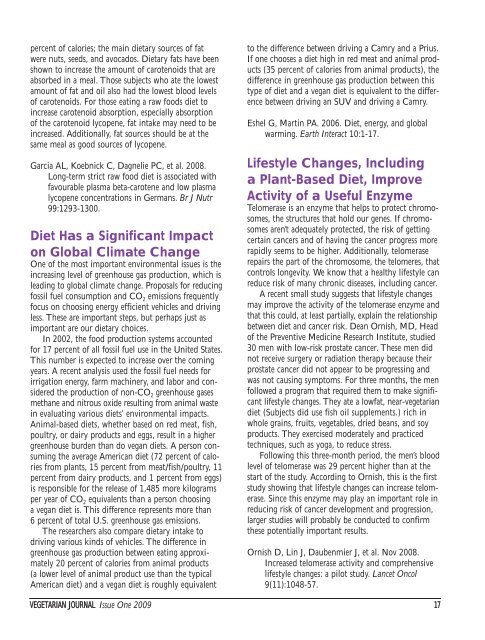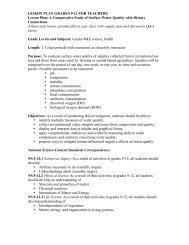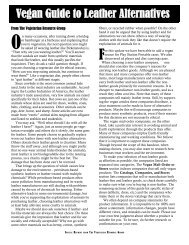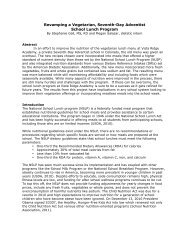Weekend Brunch Ideas - The Vegetarian Resource Group
Weekend Brunch Ideas - The Vegetarian Resource Group
Weekend Brunch Ideas - The Vegetarian Resource Group
Create successful ePaper yourself
Turn your PDF publications into a flip-book with our unique Google optimized e-Paper software.
percent of calories; the main dietary sources of fatwere nuts, seeds, and avocados. Dietary fats have beenshown to increase the amount of carotenoids that areabsorbed in a meal. Those subjects who ate the lowestamount of fat and oil also had the lowest blood levelsof carotenoids. For those eating a raw foods diet toincrease carotenoid absorption, especially absorptionof the carotenoid lycopene, fat intake may need to beincreased. Additionally, fat sources should be at thesame meal as good sources of lycopene.Garcia AL, Koebnick C, Dagnelie PC, et al. 2008.Long-term strict raw food diet is associated withfavourable plasma beta-carotene and low plasmalycopene concentrations in Germans. Br J Nutr99:1293-1300.Diet Has a Significant Impacton Global Climate ChangeOne of the most important environmental issues is theincreasing level of greenhouse gas production, which isleading to global climate change. Proposals for reducingfossil fuel consumption and CO 2 emissions frequentlyfocus on choosing energy efficient vehicles and drivingless. <strong>The</strong>se are important steps, but perhaps just asimportant are our dietary choices.In 2002, the food production systems accountedfor 17 percent of all fossil fuel use in the United States.This number is expected to increase over the comingyears. A recent analysis used the fossil fuel needs forirrigation energy, farm machinery, and labor and consideredthe production of non-CO 2 greenhouse gasesmethane and nitrous oxide resulting from animal wastein evaluating various diets’ environmental impacts.Animal-based diets, whether based on red meat, fish,poultry, or dairy products and eggs, result in a highergreenhouse burden than do vegan diets. A person consumingthe average American diet (72 percent of caloriesfrom plants, 15 percent from meat/fish/poultry, 11percent from dairy products, and 1 percent from eggs)is responsible for the release of 1,485 more kilogramsper year of CO 2 equivalents than a person choosinga vegan diet is. This difference represents more than6 percent of total U.S. greenhouse gas emissions.<strong>The</strong> researchers also compare dietary intake todriving various kinds of vehicles. <strong>The</strong> difference ingreenhouse gas production between eating approximately20 percent of calories from animal products(a lower level of animal product use than the typicalAmerican diet) and a vegan diet is roughly equivalentto the difference between driving a Camry and a Prius.If one chooses a diet high in red meat and animal products(35 percent of calories from animal products), thedifference in greenhouse gas production between thistype of diet and a vegan diet is equivalent to the differencebetween driving an SUV and driving a Camry.Eshel G, Martin PA. 2006. Diet, energy, and globalwarming. Earth Interact 10:1-17.Lifestyle Changes, Includinga Plant-Based Diet, ImproveActivity of a Useful EnzymeTelomerase is an enzyme that helps to protect chromosomes,the structures that hold our genes. If chromosomesaren’t adequately protected, the risk of gettingcertain cancers and of having the cancer progress morerapidly seems to be higher. Additionally, telomeraserepairs the part of the chromosome, the telomeres, thatcontrols longevity. We know that a healthy lifestyle canreduce risk of many chronic diseases, including cancer.A recent small study suggests that lifestyle changesmay improve the activity of the telomerase enzyme andthat this could, at least partially, explain the relationshipbetween diet and cancer risk. Dean Ornish, MD, Headof the Preventive Medicine Research Institute, studied30 men with low-risk prostate cancer. <strong>The</strong>se men didnot receive surgery or radiation therapy because theirprostate cancer did not appear to be progressing andwas not causing symptoms. For three months, the menfollowed a program that required them to make significantlifestyle changes. <strong>The</strong>y ate a lowfat, near-vegetariandiet (Subjects did use fish oil supplements.) rich inwhole grains, fruits, vegetables, dried beans, and soyproducts. <strong>The</strong>y exercised moderately and practicedtechniques, such as yoga, to reduce stress.Following this three-month period, the men’s bloodlevel of telomerase was 29 percent higher than at thestart of the study. According to Ornish, this is the firststudy showing that lifestyle changes can increase telomerase.Since this enzyme may play an important role inreducing risk of cancer development and progression,larger studies will probably be conducted to confirmthese potentially important results.Ornish D, Lin J, Daubenmier J, et al. Nov 2008.Increased telomerase activity and comprehensivelifestyle changes: a pilot study. Lancet Oncol9(11):1048-57.VEGETARIAN JOURNAL Issue One 2009 17
















